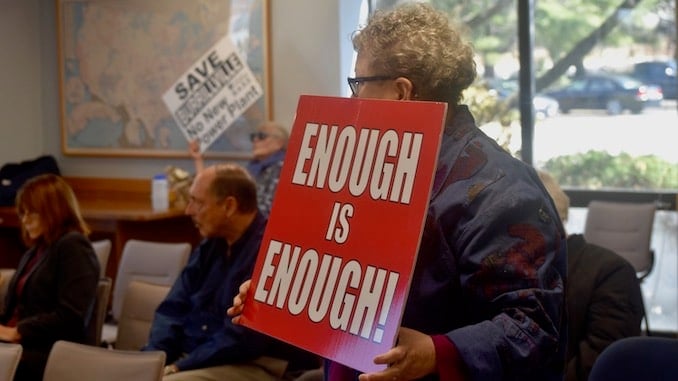EFSB issues final order on power plant; Invenergy has 10 days to appeal
“Invenergy’s case was not helped by the lengthy delays,” reads the EFSB’s final order. “…It is worth noting that the vast majority of delays were caused by the Applicant.” The final order from the Energy Facilities Siting Board (EFSB) on Invenergy‘s proposed $1B fracked gas and diesel oil burning power plant for Burrillville, Rhode Island was issued Tuesday. There were
November 5, 2019, 2:42 pm
By Steve Ahlquist
“Invenergy’s case was not helped by the lengthy delays,” reads the EFSB’s final order. “…It is worth noting that the vast majority of delays were caused by the Applicant.”
The final order from the Energy Facilities Siting Board (EFSB) on Invenergy‘s proposed $1B fracked gas and diesel oil burning power plant for Burrillville, Rhode Island was issued Tuesday. There were no big surprises. The order formalizes the unanimous vote taken by EFSB members Margaret Curran, Janet Coit and Meredith Brady on June 20, rejecting Invenergy’s application because the company could not show that their proposed power plant was actually needed to supply power to Rhode Islanders.
“As we said in June, this is a huge victory for Rhode Island and for the health of our communities,” said Conservation Law Foundation (CLF) Senior Attorney Jerry Elmer in a statement. “In the face of climate emergency, opening a fossil fuel plant that will spew carbon pollution for decades is simply reckless. After years of lies and misinformation, Invenergy’s efforts to pave over a forest to build this dirty plant have been dealt a substantial loss. This is proof that communities can stand up to big gas and win.”
The order begins with a review of the case, which took over four years, the longest power plant application case in the EFSB’s 30-year history. The order notes that, “[t]he proceedings in this docket took a long time,” continuing:
“And Invenergy’s case was not helped by the lengthy delays. The market changes that accrued over the four forward capacity auctions conducted during the pendency of Invenergy’s application undercut the credibility of Invenergy’s original arguments on the issue of need. It is worth noting that the vast majority of delays were caused by the Applicant. Examples include Invenergy’s selection of a site without a readily accessible source of water to use for the Facility’s operation; its need to locate an acceptable water source and submit a revised water plan; its filing of a subsequent supplemental water plan; its attempts to modify ISO-NE’s interconnection tariff; and its challenging ISO-NE’s request to terminate Unit One’s CSO. These actions required the Board to seek supplemental Advisory Opinions, additional information by discovery, and supplemental prefiled testimony to ensure that the record contained comprehensive information on newly-incorporated issues. The Board also had to schedule additional hearings so it could hear and rule on new evidence and hold an additional public comment hearing in Charlestown. Moreover, the matter was twice suspended at the request and/or with the concurrence of the Applicant.“
The rest of the report considers various aspects of Invenergy’s case for need, dismissing them each in turn. The EFSB found that Burrillville’s expert witness on the issue of need, Glen Walker was very credible:
“With regard to the CSO, the Board found that Mr Walker’s credible testimony regarding the termination of Unit One’s CSO, Unit Two’s failure to ever obtain a CSO, Invenergy’s ability to shed its Unit One CSO for two auction periods before it was terminated, and ISO-NE’s procuring surplus in excess of 1,000 MW for the past four auctions strongly indicated the proposed Facility was not needed.“
The EFSB similarly found Robert Fagan, CLF’s expert witness on need, to be instructive, credible and convincing when it came to Invenergy’s contentions regarding announced and at-risk energy facility retirements across the New England region. Invenergy had contended, inaccurately, according to the EFSB, that these power plant retirements necessitated the building of Invenergy’s power plant.
Arguments made by Invenergy that Rhode Island is “an import-constrained zone” were similarly ejected by the EFSB in favor of testimony from Walker and Fagan to the contrary.
Additionally, the EFSB found that significant additional renewable energy sources such as large scale offshore wind, land-based wind, behind-the-meter solar systems, and imported hydroelectric capacity provide a significant increase in capacity and support declining demand in New England.
The EFSB therefore concluded that Invenergy, “failed to show by a preponderance of the evidence that its proposed Facility is “necessary to meet the needs of the state and/or region for energy of the type to be produced by the proposed facility.”
Invenergy now has ten days to appeal the decision to the Rhode Island Supreme Court. If Invenergy fails to appeal, the decision stands and is final. If appealed, the case may not ultimately resolve until early to mid 2020.
UpriseRI is entirely supported by donations and advertising. Every little bit helps:
Become a Patron!



